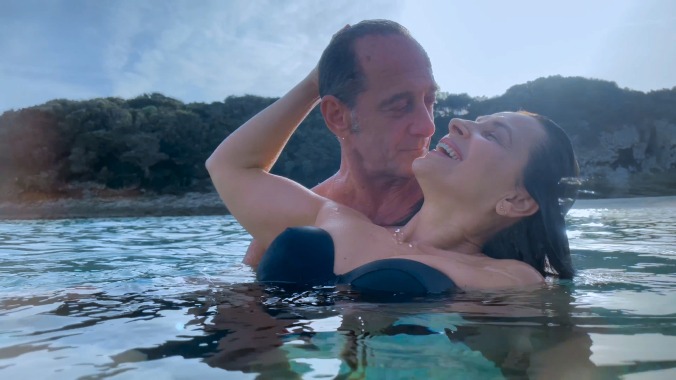In Both Sides Of The Blade, a love triangle fails to connect
Claire Denis' latest may have earned the directing award at Berlin, but it's unlikely to win over many viewers

Claire Denis’ Both Sides Of The Blade contains at least one cinematic first. While this is far from the only movie shot during COVID that acknowledged the worldwide pandemic (does Bad Luck Banging Or Loony Porn hold the record for “most PPE in a motion picture?”), this is possibly the first to use the application of a plain paper mask dramatically.
As Sara (Juliette Binoche) approaches her place of business (Radio France Internationale) she sees, out of the corner of her eye, her former lover François (Grégoire Colin) on a motorcycle. But she glimpses him as she is in the act of masking up (wait, is that symbolic?) and the camera holds as she stares off, slowly and expressively working the string around the back of her ears. This is what actors call “doing business,” a way of squeezing emotion out of mundane tasks. The added peculiarity of our recent reality reflected back sharpens onscreen, and it is (forgive me) breathtaking.
Later in the film, there are some lovemaking scenes between Binoche and her current partner of a decade, Jean (Vincent Lindon), and now that he’s back in her life, separately with François. Lindon is 62. Binoche is 58. This is not retirement age, but for onscreen nudity it’s typically well beyond it. The scenes are frank (though not lewd) and stand out simply because this is the type of thing that one ordinarily does not see.
These sparkling moments in Both Sides Of The Blade—grace notes, if you will, that are not particularly essential for the plot—are worth discussing up front, perhaps as a way to cushion the following blow: this movie is not particularly good. One seizes upon highlights from the sideline when what’s happening front and center is just so dull.
Sara and Jean live in a lovely Paris apartment with a balcony, and when we meet them they’ve returned from a gorgeous seaside vacation. Sara hosts a public affairs radio show; we watch her interview an activist in Lebanon and another of West Indian heritage. If she maintains a true interest in social justice, she saves it all for the show. Her life at home is spent moping around, and this mere fragmentary appearance from her ex transforms her into an obsessive. (Why she didn’t just look him up at some point in the last few years is not known.)
Jean is a little bit of a mess. His chiseled-from-rock face toggles between exasperated and sullen. Though the specifics remain vague, we know that he is an ex-rugby player, he did some time in prison, and has a mixed-race teenage son (Issa Perica) being raised by his mother (Bulle Ogier, the only performance with the breath of life in it). Jean can’t find find work until, weirdly, the same day that Sara sees François, when François calls him out of the blue. (They were all friends once, you see.) François is starting a scouting agency, and thinks Jean can help.
This leads to a great many scenes in which people scowl and look worried. Eventually the scowls turn to yelling. They yell on the balcony, they yell in the bathroom, they yell into phones. Jean, who ignores his son most of the time, catches wind of him potentially stealing, then yells at him for not maintaining a post-racial attitude in life. (There is some ambiguity over who, exactly, is siphoning cash from Jean’s mother’s bank account. Is it indeed the kid, or Jean himself?) Mati Diop also shows up for a cumulative 45 seconds, just so you can scratch your head and wonder how the hell she fits into all this. Everyone continues to scowl and yell until the movie is over and Sara learns an important lesson about backing up her data in the cloud.
But the conflict at hand, and the manner in which it is shown, is at such a reserve it is difficult to care about all this. Naturally, the threshold where one feels invested in the emotional toil of a film’s character is different for everyone, but this critic—an enormous softie who usually soaks emotion like a sponge!—found himself mumbling “oh, who cares?” back at the screen. There was even a second viewing attempt made, just to be sure.
Both Sides Of The Blade is the second collaboration between Denis, Binoche and writer Christine Angot following the far more engaging Let The Sunshine In, another film in which Binoche plays a woman unhappy in her relationships, but is far less suffocating. Binoche also starred in Denis’ innovative lo-fi interstellar odyssey High Life, and Denis has no shortage of truly great films (Chocolat, Beau Travail, White Material, Bastards) under her belt. But you can’t have a hit with every at bat, and this latest, despite winning the Best Director award at the Berlin Film Festival, fails to connect. Perhaps that jury was just overwhelmed by the memory of past love.